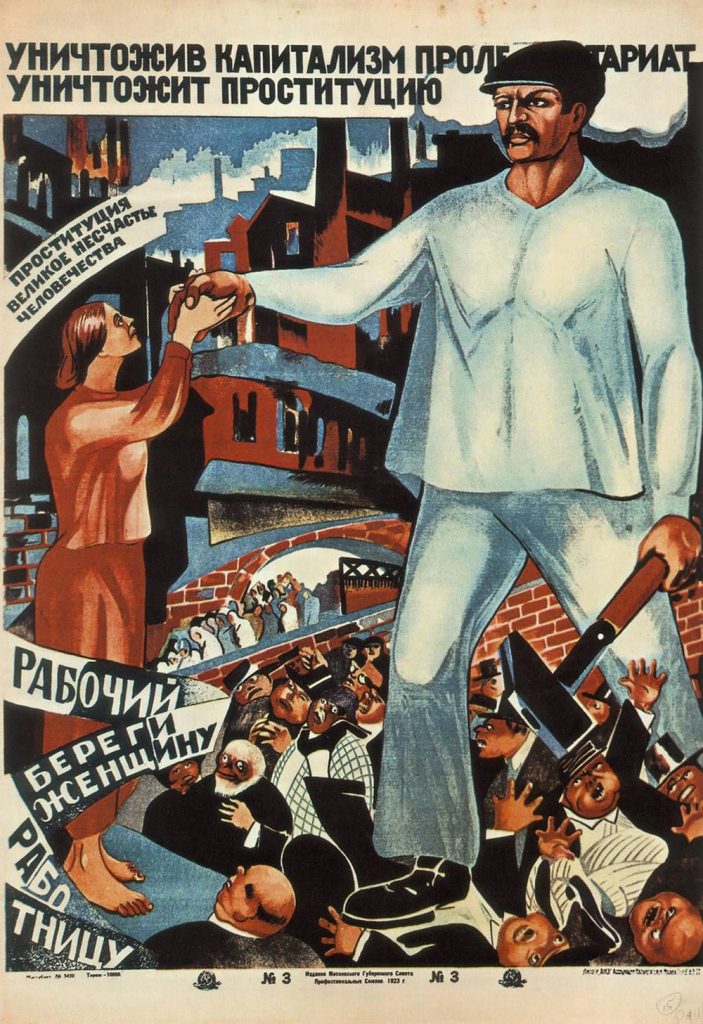Fallacies of prostitution: revisionism and whitewashing~ 5 min

By Aline Rossi
Part one of three.
Revisionism and fallacies about prostitution
It’s surprisingly common to find pro-pimping positions in sectors of the international Left, going against the entire history of the worker’s movement – as well as the analysis made by women such as Rosa Luxemburg, Nadezhda Krupskaya and Emma Goldman.
In Portugal, the propaganda for legalizing prostitution demand is mostly made by the Socialist Party and the Left Bloc. In Brazil, the project proposing the legalization of demand comes from the Socialism and Liberty Party (PSOL), in a law proposal which allows third parties to legally appropriate themselves of up to 50% of the income of a prostituted person. In the UK, the conflict is with the Labour Party.

The mental gymnastics necessary to reformulate the world’s oldest female oppression into “the world’s oldest profession” are varied: from linguistic whitewashing that transforms “prostitution” into “sex work” and “financially coerced sex” into “sexual service”, up to even more far-fetched arguments such as claiming sex is a right.
What they can’t reformulate, however, is this old revisionism called misogyny.
Semantic whitewashing
The revisionism starts with the choice of language used to describe or refer to prostitution. The conscious choice of painting socially, economically and physically vulnerable women as “sex workers” is a good example.
Using the words “worker” and “work” is nothing but a pleasant way of washing your hands of the situation, as it then stops being a structural, political and economical issue and it becomes a question of an individual professional career choice – which, as it happens, is something defenders of “sex work” themselves emphasize. Through this apparently simple semantic reframing, they can individualize what is clearly, statistically, a structural problem. Worldwide.
Prostitution is more about structural economic and social oppression of women, the product of a society that for centuries didn’t recognize or remunerate women’s work in the productive and reproductive spheres (including legally forbidding their participation, and relegating women to slave labor, through racist hierarchies, or through financial dependence on men, by using the other side of prostitution, marriage) than about actual work.
In not so distant times, in which neither divorce nor inheritance nor work were rights of women, but in which sex in the marriage was a right of the husband (and consequently a duty of the wife), separation or widowhood tended to create a prostitute rather than an heiress. It would be, at minimum, ahistorical (although the correct word for it is cynicism) to ignore the consequences of this process in the present day – even today, in countries such as South Africa, Mexico and even some regions of Brazil, prostitution is intergenerational.
We understand that men do things they do not like to do in order to earn a wage. When men do alienating labor in a factory we do not say that the money transforms the experience for them such that they loved it, had a good time, and in fact, aspired to nothing else. We look at the boredom, the dead-endedness; we say, surely the quality of a man’s life should be better than that.
– Andrea Dworkin, in “Prostitution and Male Supremacy”
We understand the concept of the alienation of work and of the worker himself, but if the alienated product is the holes of a woman for sexual consumption and if the person being alienated from her own humanity and personhood is a woman, then the best solution certainly is to legitimize exactly in the same terms that would be recognized as inhuman towards any other person.
Furthermore – and most importantly as women are concerned – one needs to ask what does it mean, in terms of rights and civil status, to recognize sex as a work or a right. If it is a right, someone must provide it for others to enjoy. How do you define who should provide these “services”? And how to ignore the fact that most people in a situation of prostitution are women, while the almost absolute majority of sex buyers are men? How to ignore women’s and men’s social construction processes in a patriarchal society, with sex being used as a delimiter of social experiences? On the other hand, if sex is work, what is rape? …Theft? Appropriation?
A recent case in Paraguay exemplifies these blurred lines quite well: a 15 year old girl was rescued after denunciations that her parents were offering her to their landlord to sexually abuse as a way of not paying rent. Her stepfather, who also abused the teenager, was arrested. The mother is being accused of promoting and facilitating prostitution. For the girl, it wasn’t prostitution. It was rape. But a financial transaction was involved and there was certainly consent – from those legally responsible for her.
The legal recognition of sex as work, service or right blurs the contours of civil rights for all women and is definitively a step back from all we have won so far in seeing rape recognized – a very recent victory, by the way.
Second part: “Fallacies of prostitution: moralism”
Aline Rossi writes in Portuguese at the blog Feminismo com Classe, where she also publishes translated feminist texts from all over the world at a prolific pace.




